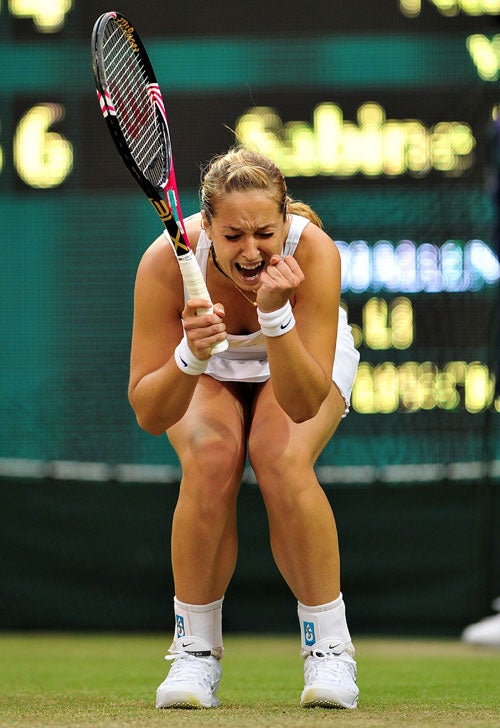Open draw boosts women's appeal
A lack of firm favourites is producing the most fascinating Wimbledon Ladies' singles in recent history

Your support helps us to tell the story
From reproductive rights to climate change to Big Tech, The Independent is on the ground when the story is developing. Whether it's investigating the financials of Elon Musk's pro-Trump PAC or producing our latest documentary, 'The A Word', which shines a light on the American women fighting for reproductive rights, we know how important it is to parse out the facts from the messaging.
At such a critical moment in US history, we need reporters on the ground. Your donation allows us to keep sending journalists to speak to both sides of the story.
The Independent is trusted by Americans across the entire political spectrum. And unlike many other quality news outlets, we choose not to lock Americans out of our reporting and analysis with paywalls. We believe quality journalism should be available to everyone, paid for by those who can afford it.
Your support makes all the difference.The lack of any clear favourites for the women's Wimbledon title, far from diminishing the competition, has given it an unexpected boost. This tournament, the most open in years, is the most competitive too.
The three-time US Open champion Kim Clijsters withdrew with injury before the tournament began and the 2004 Wimbledon champion, Maria Sharapova, is in uneven form. Venus and Serena Williams – former and reigning champions respectively – have returned after long injury lay-offs, but where once one of the Williams sisters, the winners in nine of the past 11 years, would have been a shoo-in for the title, there are now a number of contenders ready to take them on.
Chris Evert, a winner at Wimbledon in 1974, 1976 and 1981, speaking before the tournament, said: "Any one of 10 or 15 could win a slam right now. It's an exciting time, with a lot of good youngsters coming through, but we're waiting to see someone really step up to the plate."
Only a few years ago a major criticism of the women's game was that it was dominated by the top 10, and that there was fall-off in talent in the rest of the top 100. It is interesting to note, then, that the men's game now has a "fab four" at the top – Roger Federer, Rafael Nadal, Novak Djokovic and Andy Murray – who consistently make the last four at the slams, meaning that the rest of the top 20 rarely get a look in.
The women's game has a much more open field; a new name has been on the silverware at this year's two previous slams. Clijsters won the Australian Open and at Roland Garros Li Na became the first Chinese player to win a slam title. Twenty-one players have won the 31 WTA titles available in 2011.
It is possible that a new name will go on the Venus Rosewater Dish on Saturday, as others – whether experienced players like the 26-year-old Marion Bartoli, who reached the final in 2007, or young talents such as Victoria Azarenka (21), Petra Kvitova (21) and Ksenia Pervak (20) – seize the moment.
In most grand slams the top players waltz through the early rounds, but even Sharapova, ranked No 6 in the world and seeded No 5 here, faced a tough second-round battle against Britain's Laura Robson, a 17-year-old who is 248 places below her in world rankings. Several seeds have gone out, including Li, who was beaten by Germany's Sabine Lisicki.
Fans are seeing longer and more keenly fought matches. In the first two rounds last year, 27 matches went to three sets; this year that figure was 34. The average length of matches increased from 87 to 91.7 minutes.
Lindsay Davenport, the 1999 champion, says: "Certainly it is [more competitive], because it's more open and lots more players feel they are in with a chance. Look at who has won the last few slams – you couldn't pick a favourite. And for sure you couldn'tsay who you think would win this year as you would in years past.
"I think it makes it more interesting for the fans, although they may miss some of the bigger names because they're used to the superstars. Not having Clijsters here and Justine Henin retiring has hurt the game, but players like Caroline Wozniacki or Victoria Azarenka are establishing themselves.
"The level at the very top has come down a little bit. But the rest of the women have raised theirs, so the difference between the top 10 and the rest isn't so wide as it once was. It's not like the men's game, where those top four have so separated themselves from the pack. I think that's a bonus for fans."
Join our commenting forum
Join thought-provoking conversations, follow other Independent readers and see their replies
Comments